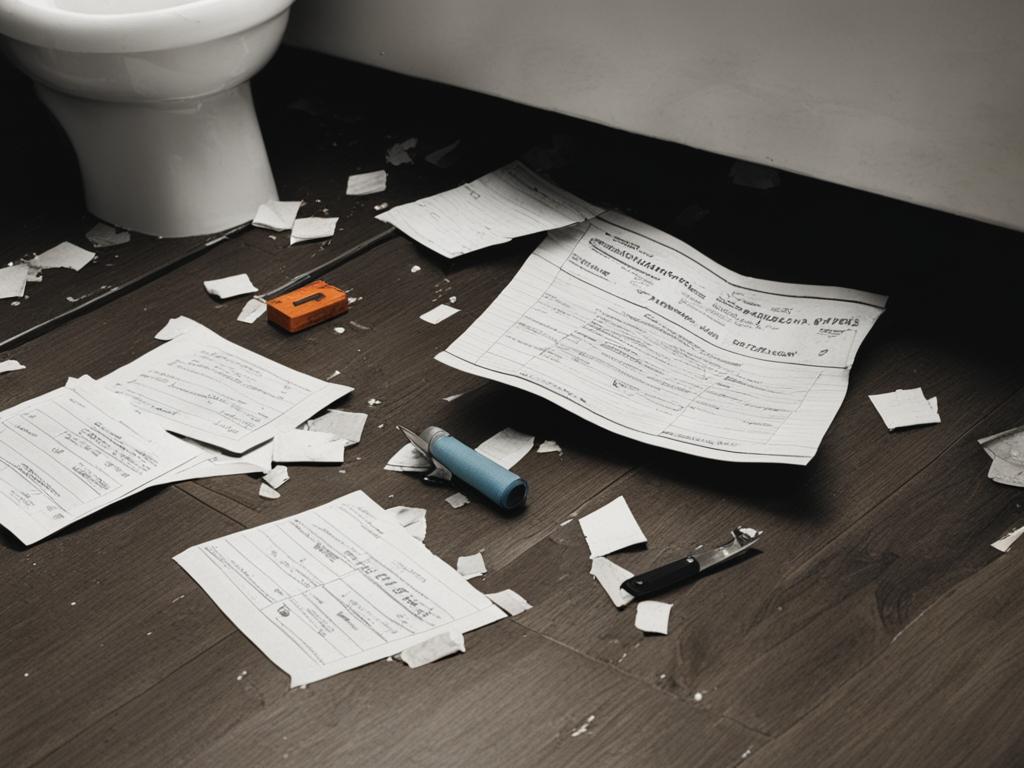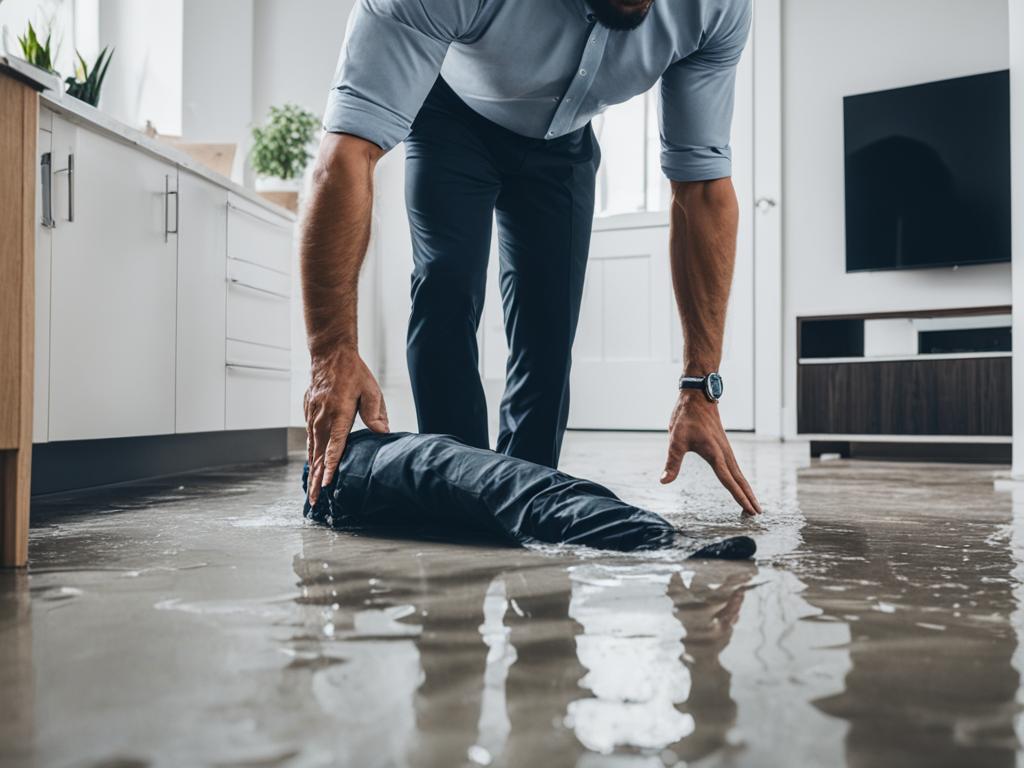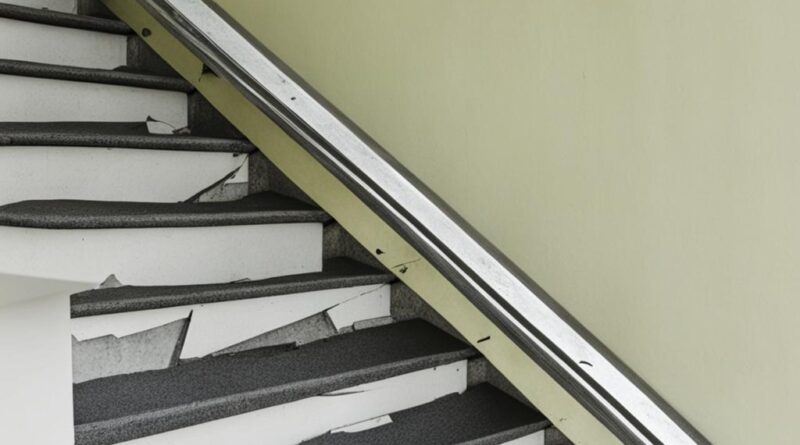Personal Injury Claim Against Landlord Guide
Filing a personal injury claim against a landlord can be a complex process. Tenants have the right to seek compensation if they are injured due to their landlord’s negligence. This guide will provide essential steps for filing a personal injury claim against a landlord, including information on landlord liability and the right to compensation.
Key Takeaways:
- Seeking compensation for personal injuries caused by a landlord’s negligence is your right as a tenant.
- A personal injury lawsuit against a landlord involves establishing the landlord’s negligence and gathering strong evidence.
- Understanding landlord liability and duty of care is crucial in pursuing a successful personal injury claim.
- Gathering evidence such as medical records, photographs, and witness statements can strengthen your case.
- Seeking legal help from an experienced personal injury lawyer can greatly assist you in navigating the legal process and negotiating for compensation.
Understanding Personal Injury Lawsuits Against Landlords
A personal injury lawsuit against a landlord is a legal claim filed by a tenant who has been harmed or injured due to the landlord’s actions or negligence. It is important for tenants to understand their rights and the steps involved in pursuing such a claim.
To have a strong case in a personal injury lawsuit against a landlord, the tenant must establish negligence on the part of the landlord. This typically involves proving that the landlord failed to maintain safe living conditions or neglected their responsibilities towards the tenant’s well-being.
Establishing negligence may require gathering evidence to support the claim. This can include documentation of any unsafe conditions, photographs of injuries or the accident scene, witness statements, and any communication with the landlord regarding the issue.
Seeking legal help from a personal injury lawyer is crucial when dealing with a personal injury lawsuit against a landlord. An experienced lawyer can provide guidance on the legal process, help gather strong evidence, and negotiate with the landlord’s insurance company on behalf of the tenant.
Remember:
A personal injury lawsuit against a landlord can help tenants seek compensation for their injuries and hold landlords accountable for negligence. However, navigating the legal process can be complex, and seeking legal guidance is essential for a successful claim.
Establishing Negligence in a Personal Injury Lawsuit against a Landlord
In a personal injury lawsuit against a landlord, you must establish negligence on the landlord’s part. This involves proving that the landlord had a duty of care towards you and failed to fulfill that duty, resulting in your injury. Examples of landlord negligence can include failure to maintain the property, address hazards promptly, or ensure fire safety.
Proving landlord negligence is crucial in building a strong case. It requires collecting evidence that demonstrates the landlord’s failure to meet their duty of care. This evidence can include photographs of unsafe conditions, maintenance records indicating neglected repairs, and witness statements corroborating the hazardous conditions.

Additionally, you may need to establish that the landlord’s negligence was the direct cause of your injury. This can be done by providing medical records supporting the link between the hazardous condition and your injury, as well as expert opinions, if necessary.
It is important to note that simply proving negligence is not enough; you must also show that you suffered harm as a direct result of the landlord’s negligence. This can include physical injuries, emotional distress, or financial loss.
By successfully establishing negligence in a personal injury lawsuit against a landlord, you increase your chances of obtaining compensation for your injuries and holding the landlord accountable for their actions.
Gathering Evidence for a Personal Injury Lawsuit against a Landlord
Gathering evidence is crucial in a personal injury lawsuit against a landlord. To strengthen your case and support your claim of landlord negligence, it’s essential to collect the following evidence:
- Medical records: Obtain copies of all medical records related to your injuries sustained from the accident. These records will help establish the extent of your injuries and the need for medical treatment.
- Photographs: Take photographs of the accident scene and your injuries as soon as possible. Visual evidence can significantly strengthen your case and provide a clear representation of the hazardous conditions that led to your injuries.
- Witness statements: Gather statements from any witnesses who saw the accident occur or can testify to the unsafe conditions caused by the landlord’s negligence. Their accounts can support your claim and provide valuable insight into the circumstances surrounding the incident.
- Communication with the landlord: Compile any written or documented communication you have had with the landlord regarding the unsafe conditions. This can include emails, letters, or text messages that highlight the landlord’s negligence or failure to address maintenance issues promptly.
Gathering substantial evidence is crucial in personal injury lawsuits against landlords. It provides indisputable proof of the landlord’s negligence and supports your claim for compensation for the damages and injuries you have suffered. A personal injury lawyer can assist you in organizing and presenting this evidence effectively, ensuring a strong case presentation.
| Evidence | Description |
|---|---|
| Medical records | Copies of all medical records related to the injuries sustained from the accident. |
| Photographs | Visual evidence of the accident scene and injuries. |
| Witness statements | Statements from witnesses who saw the accident occur or can testify to the landlord’s negligence. |
| Communication with the landlord | Written or documented communication highlighting the landlord’s negligence or failure to address maintenance issues promptly. |
Seeking Legal Help for a Personal Injury Lawsuit against a Landlord
Filing a personal injury lawsuit against a landlord in Los Angeles can be a complex process. When pursuing a case against a landlord for personal injury, it is crucial to seek legal help from an experienced personal injury lawyer. An attorney specializing in personal injury law can provide valuable guidance and support throughout the legal process.
One of the key roles of a personal injury lawyer is to assist with gathering evidence. They can help you collect medical records, photographs of the accident scene and injuries, witness statements, and any communication with the landlord regarding unsafe conditions. This evidence will be vital in establishing a strong case for landlord negligence.
Furthermore, a personal injury lawyer can help negotiate with the landlord’s insurance company on your behalf. Insurance companies may try to offer a lower compensation amount or deny your claim altogether. An experienced lawyer can advocate for your rights and work towards securing fair compensation for your injuries.
If your case proceeds to court, a personal injury lawyer will represent you during litigation. They will present your case, cross-examine witnesses, and argue on your behalf. Their expertise in personal injury law can significantly increase your chances of a favorable outcome.
Benefits of Hiring a Personal Injury Lawyer for a Landlord Injury Claim:
- Legal expertise: Personal injury lawyers have in-depth knowledge of the legal process and can guide you through each stage of your case.
- Negotiation skills: Lawyers are skilled negotiators who can effectively communicate with insurance companies and fight for fair compensation.
- Experience with similar cases: Personal injury lawyers have dealt with numerous landlord injury cases and understand the complexities involved.
- Resources and connections: Lawyers have access to resources, such as expert witnesses, that can strengthen your case.
- Peace of mind: Hiring a lawyer allows you to focus on your recovery while they handle the legal aspects of your case.
Compensation Factors in Personal Injury Lawsuits against Landlords
Types of Accidents Resulting in Personal Injury Lawsuits against Landlords
When it comes to personal injury lawsuits against landlords, there are several common accidents that can lead tenants to seek legal recourse. These accidents can range from slip and fall incidents to fires, exposure to hazardous materials, and even criminal activity due to negligent security.
One of the most prevalent types of accidents resulting in personal injury lawsuits against landlords is slip and falls. These accidents can occur due to hazardous conditions such as wet floors, uneven surfaces, or inadequate lighting. If a tenant suffers injuries from a slip and fall incident on the landlord’s property, they may be eligible to file a personal injury lawsuit.
Fires are another significant cause of personal injury lawsuits against landlords. If a fire breaks out on the rental property due to the landlord’s negligence, such as failure to maintain electrical systems or smoke detectors, tenants who sustain injuries may have grounds for a lawsuit.
Exposure to hazardous materials, such as toxic chemicals or mold, can also result in personal injury claims against landlords. Landlords have a responsibility to maintain a safe and healthy living environment. If a tenant becomes ill or injured due to exposure to hazardous materials, they may have a viable personal injury claim.
Criminal activity due to negligent security is yet another cause for personal injury lawsuits against landlords. Landlords are expected to take reasonable measures to protect their tenants from foreseeable harm, such as installing proper lighting, securing entrances, or providing appropriate locks. If a tenant becomes a victim of a criminal act on the landlord’s property due to inadequate security measures, they may have the right to seek compensation.
It is crucial for landlords to prioritize safety and take the necessary precautions to prevent these accidents. By doing so, they can minimize the risk of personal injury lawsuits and ensure the well-being of their tenants.
“Landlords must be proactive in ensuring the safety of their rental properties to prevent accidents and protect their tenants from harm.”

Table: Common Accidents Resulting in Personal Injury Lawsuits against Landlords
| Accident Type | Causes | Potential Injuries |
|---|---|---|
| Slip and Falls | Wet floors, uneven surfaces, inadequate lighting | Bruises, fractures, head injuries |
| Fires | Negligence in maintaining electrical systems, smoke detectors | Burns, smoke inhalation, property damage |
| Exposure to Hazardous Materials | Toxic chemicals, mold, asbestos | Illness, respiratory problems, allergic reactions |
| Criminal Activity | Inadequate security measures, lack of proper lighting, unsecured entrances | Assault, robbery, emotional distress |
Conclusion
Filing a personal injury claim against a landlord is a crucial step in seeking justice and compensation for injuries caused by their negligence. As a tenant, it is vital to understand your rights and take appropriate actions to protect yourself.
Gathering strong evidence is essential to support your personal injury claim. This can include collecting medical records, taking photographs of the accident scene and your injuries, obtaining witness statements, and retaining any communication with the landlord regarding unsafe conditions. These pieces of evidence will strengthen your case and increase the likelihood of a favorable outcome.
Seeking legal help from an experienced personal injury lawyer is highly recommended when pursuing a personal injury claim against a landlord. A knowledgeable attorney can guide you through the complex legal process, negotiate with the landlord’s insurance company on your behalf, and represent you in court if necessary. They can also assist in assessing the appropriate compensation for your injuries.
Landlords must prioritize safety and take necessary precautions to prevent accidents that may result in personal injury lawsuits. By maintaining safe living conditions, promptly addressing hazards, and ensuring fire safety measures, landlords can minimize the risk of injuries and contribute to creating a safer community.
FAQ
What is a personal injury lawsuit against a landlord?
A personal injury lawsuit against a landlord is a legal claim filed by a tenant who has been harmed or injured due to the landlord’s actions or negligence.
How can I establish negligence in a personal injury lawsuit against a landlord?
To establish negligence, you must prove that the landlord had a duty of care towards you and failed to fulfill that duty, resulting in your injury.
What evidence should I gather for a personal injury lawsuit against a landlord?
Important evidence includes medical records, photographs of the accident scene and injuries, witness statements, and any communication regarding unsafe conditions with the landlord.
Should I seek legal help for a personal injury lawsuit against a landlord?
Yes, it is advisable to seek legal help from an experienced personal injury lawyer who can assist with gathering evidence, negotiating with the landlord’s insurance company, and representing you in court if necessary.
What types of accidents can lead to personal injury lawsuits against landlords?
Slip and fall incidents, fires, exposure to hazardous materials, and criminal activity due to negligent security are common accidents that can result in personal injury lawsuits against landlords.
How can I file a personal injury claim against my landlord?
Filing a personal injury claim against your landlord involves understanding your rights, gathering strong evidence, and seeking legal help to navigate the legal process.
What can I expect in terms of compensation for a personal injury claim against my landlord?
The amount of compensation you may receive for your personal injury claim against your landlord will depend on various factors, including the extent of your injuries and the negligence of the landlord. An experienced personal injury lawyer can help determine the potential compensation you may be entitled to.

